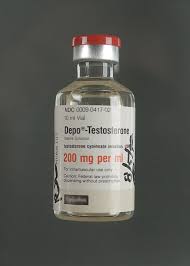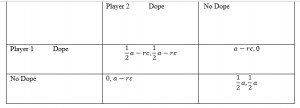Today, steroid use among professional athletes gets a lot of spotlight in the media. Those stories about “how the mighty have fallen” resonate the same message time and time again: kids, don’t ever use drugs. This public exposure has massive consequences; it tarnishes a professional’s athletic reputation (I’m sure Lance Armstrong can attest), handicaps their prospects for future endorsements, and leads fans to question their favorite star’s ethics. We can understand the allure of abusing performance enhancing drugs (PEDs), but while it is highly scrutinized in professional sports, this problem is less known among lower levels of sports competition. This week I interviewed economics guru, Max Peterson, who explained PED use among high school athletes.
HR: How prevalent is this problem?
According to my research, roughly 11% of male high school athletes, and 4.5% of their female counterparts, have tried or have continued to use PEDs as of 2011.

HR: Why are the incentives for using PEDs different among high school students versus professionals?
While professional athletes who choose to use PEDs are looking for a higher salary or more endorsement deals, high school athletes may see PEDs as a means to achieve a collegiate scholarship. They hope to impress college coaches who may be scouting them or to simply augment their natural ability.
HR: What are the costs and benefits for using PEDs for high school students?
An obvious benefit is that PEDs can enhance performance by making an athlete stronger or more alert than a drug free athlete. Student athletes may see PEDs as a way to further enhance their abilities if they feel that they have reached their natural peak. As far as costs go, we all know about how steroids in particular may affect the adolescent body. Health effects may include increased testosterone and estrogen in females and males respectively, increased chance of heart disease or cardiac arrest, potential for stunted growth, and more. Another thing not considered by many students is the monetary consequence of being exposed as a drug abuser. If a collegiate program finds out about your suspension for use of PEDs, they may not even consider you for a scholarship.

HR: Can you describe what your case study in your thesis covered?
As part of my thesis, I did a case study that researched different PED policies for a few high schools. I wanted to examine each school’s policy and see how it would affect the choice space for potential or current PED users at their respective schools. Ultimately I wanted to see if there could be a hypothetical “optimal” policy that would limit PED use the most.
HR: What are the policy implications from the case and potential issues?
The overall potential effective policy I uncovered was swift and decisive action against any user or distributor of PEDs. The three policies from the high schools I looked at each had their strengths and their weaknesses, but the biggest mistake I could see in all of them is the slowness by which a user is punished. In the case of one school, it would take a user 3 separate occurrences to actually incur punishment of suspension from sport. A counterargument against this policy is that schools should foster an environment allowing kids to be able to make mistakes and learn from them. It might seem excessive to punish an athlete to the point of ruining collegiate aspirations because of one “dumb” decision.

HR: What kind of economic concepts are embodied by your topic?
There are a lot of interesting economic topics that come up in the world of high school sports and the PED users in that world. One piece of literature that I read was a game-theoretic model of the choice to use PEDs in professional athletes. This paper proposed a basic, one-shot, simultaneous game where two athletes faceoff in a competition, where the one who chooses to use steroids wins with certainty, and both have 50% probability of winning if they both do not take the drug or both take the drug. Basically the game ends with an equilibrium of both choosing to use steroids given what the other competitor’s options are.

